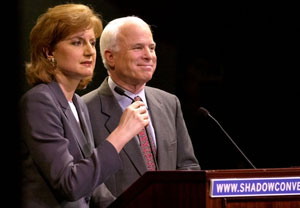In the ACLU's newly re-titled "Blog of Rights" Matt Coles, Director, ACLU Lesbian Gay Bisexual Transgender & AIDS Project
writes the following From a constitutional lawyer’s standpoint, [the California Supreme Court gay marriage] decision is just about everything we could have hoped for. The Court rules—in general—that sexual orientation is not a legitimate reason to treat gay people differently. In lawyer’s jargon, the court held that sexual orientation is a “suspect” classification, just like gender and race classifications.
The Court also holds that even though history is important in deciding what a fundamental constitutional right is, courts should not respect traditional restrictions on who got to exercise the right in the past.
The Court puts these rulings together and says that since the right to marry is fundamental, denying it to any group of people is highly suspect. Moreover, the Court says, since the law denies gay people the right to marry, this particular exclusion is highly suspect.
I certainly am pleased with the court's decision and have always favored allowing gays to marry. But this reasoning raises a number of questions for me. (I don't have time to read the decision, which might answer my questions.)
What does it mean to say that the right to marry is fundamental? What does the right to marry mean? To which pairs of people is it available? What qualifications, if any, must people satisfy to be permitted to marry? Can
any two adults marry? Other than the polygamy restriction, are there any pair of adults who are not now permitted to marry?
What obligations does marriage entail? What rights does it provide?
Basically I'm wondering whether this position says that marriage has nothing at all to do with love and that any two people who choose to enter into the legal marriage relationship have a "fundamental" right to do so?
Why should that right be fundamental? What is so fundamental about it? It is different from any other "right?"
I'm not necessarily objecting to that position, but is that the position of the court? If so, it makes marriage even more of an administrative and legal relationship and removes it even further from notions such as having a sexual relationship, emotional pair bonding, and families.
Do any two people who find the legal relationship of marriage to their advantage have a right to enter into it—in the same way that any two people who find any other legally acceptable contractual relationship to their advantage have a right to enter into that relationship?
 .
. 








